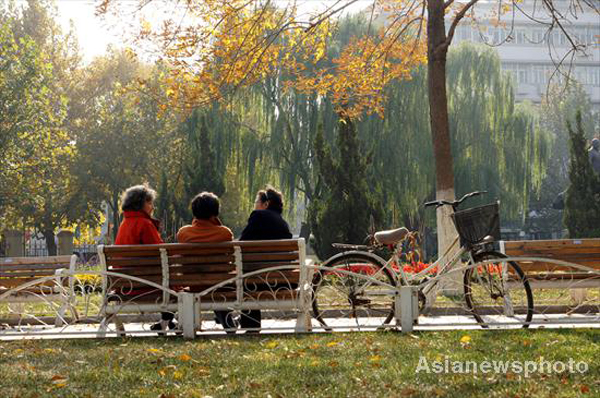Elder care seen as a key concern in a graying nation
Updated: 2016-03-02 07:03
(China Daily)
|
||||||||
Today's catchphrase-Aging population-The aging of China's population is progressing rapidly, with the number of people aged 60 and older expected to expand to one-third of the population by the middle of the century. But healthcare services for the elderly, such as rehabilitative and hospice services, are lacking in many places in China. Measures are being taken to cope with the challenges, such as encouraging the integration of elderly care with healthcare services to ensure that the elderly receive proper care.
Zhang Shouzi, a psychiatrist at Beijing Geriatric Hospital, has seen the number of patients seeking treatment for dementia in the hospital increasing over the past few years, resulting in some patients having to wait for weeks to get a bed.
"The situation may get worse in the future with the aging of the population in Beijing," Zhang said. "The incidence of dementia rises with the increase of age, and up to 40 percent of people aged 85 or older may develop the condition."
To cope with the growing number of elderly patients, the hospital is increasing the number of beds, and it opened a new complex in January, according to Yang Yingna, a publicity official of the hospital.
That complex has 400 beds and is equipped with better facilities to meet the increasing demands, she said.
With the rapid aging of the Chinese population, major cities such as Beijing are working out plans on coping with the healthcare needs of the elderly.
By the end of 2014, the number of Chinese aged 60 or older reached 212 million, more than 15 percent of the population, according to the Ministry of Civil Affairs. Some experts predict that it will swell to more than one-third of the population by 2050, when China will become one of the countries most heavily burdened by population aging.
Beijing had 3.2 million permanent residents aged 60 or older by the end of 2014, and their number is predicted to reach 4 million by 2020, according to the Beijing Civil Affairs Bureau.
President Xi Jinping said in February that coping with population aging concerns China's overall development and the interests of hundreds of millions of people. He urged the government to improve major policies such as family planning, employment and elder care to cope with the problem.
China will encourage the integration of healthcare and elderly care services to meet the challenges, according to a guideline the State Council, or the Cabinet, released in November.
- Cuba intensifies fight to fend off Zika virus
- UN chief calls for 'prompt, impartial' probe into airstrike on Yemeni market
- Ex-Tepco execs indicted over Fukushima disaster
- British PM threatened with 'no confidence vote' over EU referendum
- 70,000 may become trapped in Greece
- Venezuela, Qatar, Saudi Arabia, Russia to meet to stabilize oil market

 China's first large passenger plane poised for maiden flight
China's first large passenger plane poised for maiden flight
 Clashes break out as France begins clearing Calais migrant camp
Clashes break out as France begins clearing Calais migrant camp
 Top 10 cities with most billionaires in 2016
Top 10 cities with most billionaires in 2016
 Milan Fashion Week: Dolce & Gabbana Autumn/Winter 2016 collection
Milan Fashion Week: Dolce & Gabbana Autumn/Winter 2016 collection
 Top moments from Oscars 2016
Top moments from Oscars 2016
 China Daily weekly photos: Feb 20-26
China Daily weekly photos: Feb 20-26
 People view plum blossoms at scenic area in E China
People view plum blossoms at scenic area in E China
 Rural e-commerce developed to promote local products in SW China
Rural e-commerce developed to promote local products in SW China
Most Viewed
Editor's Picks

|

|

|

|

|

|
Today's Top News
What ends Jeb Bush's White House hopes
Investigation for Nicolas's campaign
Will US-ASEAN meeting be good for region?
Accentuate the positive in Sino-US relations
Dangerous games on peninsula will have no winner
National Art Museum showing 400 puppets in new exhibition
Finest Chinese porcelains expected to fetch over $28 million
Monkey portraits by Chinese ink painting masters
US Weekly

|

|








